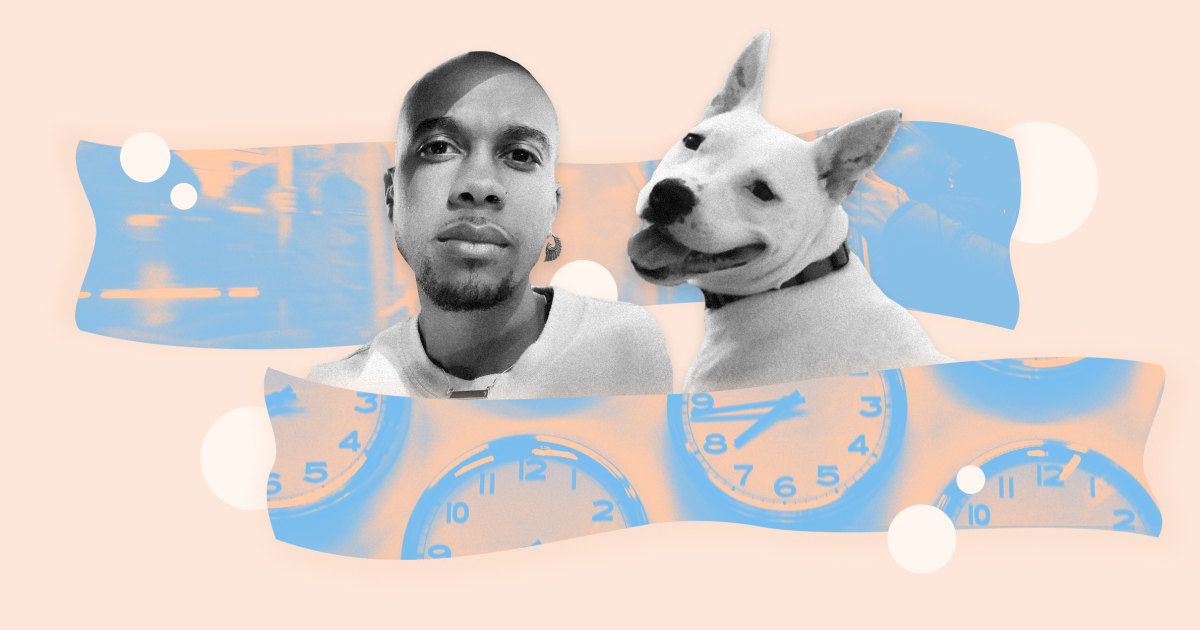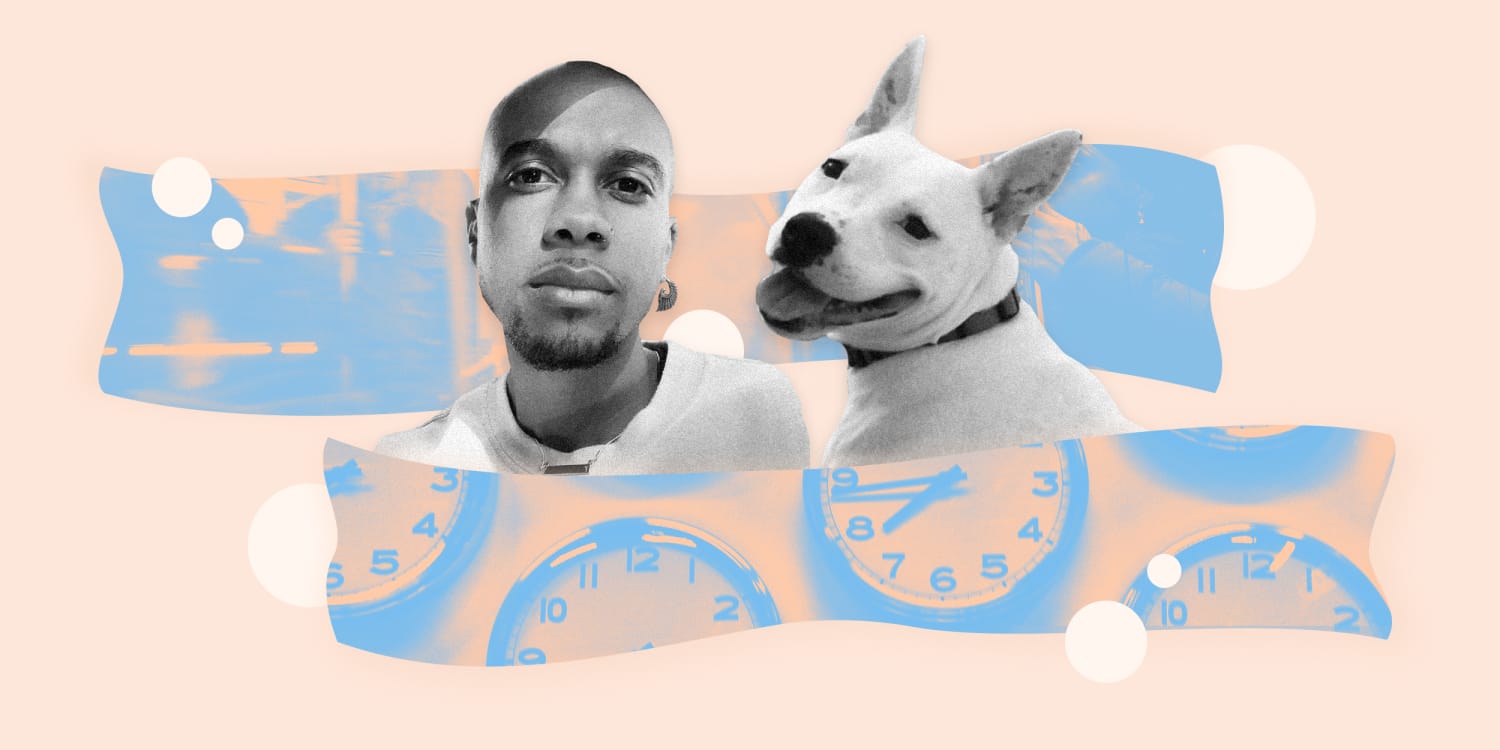
By the time I normally reach my subway stop, the white faces mostly seep out of the subway. Nostrand Avenue acts as the Brooklyn-bound C train’s water purifier: White folks are the residue extracted through distillation, but there’s no one to change the filter when it stops working — when gentrification really comes for us.
That summer day, I was exhausted, but my dog couldn’t have cared less, hopping up and down in excitement as soon as I opened the door. I changed into something more appropriate for the weather as she followed me to every room I walked through, waiting patiently at each entrance, tail infused with a jolt of life whenever I happened to make even the briefest eye contact.
“Let’s go, Khia,” I said, throwing on her harness. Once upon a time, I didn’t like going for walks around the block; for Khia, I do it twice a day and, in return, she never leaves me alone for too long.
“He maaaad nice!” Old Dude shouted at me from across the street, holding on to the “a” as though, if he lost it too soon, he’d lose himself. Or maybe he held on to it just so that he could lose himself in the expanse he created with it. I didn’t know. But I knew that he was from Brooklyn.
The way you hold words means something here — something about loss and survival. It’s not always easy to tell which of the two. And it’s not always a binary: It’s not just how long you hold words, but where you let them drop and where you pick them back up.
“What breed is he?”
“She’s a pit bull,” I responded, but my voice, being the light, bass-less thing that it is, abandoned its mission halfway across the street and never reached his ears.
For that moment, he could talk to queer old me without restraint, without feeling a hatred toward his own relationship to manhood, and without taking that hatred out on me.
“Huh?”
“Pit bull!” I said a little louder, the effort of speaking at grown-man decibel-level taking the air out of me. He waved me over. I was walking the other way, but I didn’t want to be rude, so I crossed the street, a little relieved that I wouldn’t have to shout anymore.
Khia was confused by the sudden departure from our regular walking routine and resisted, so I used the harness to pull her back. Google says if we deviate from the same route every day, she won’t be so hardheaded about walking, but she’s too hardheaded to deviate.
“What breed?” Old Dude repeated.
“Pit bull,” I responded.
“Whaaaa? He hella small. He full grown? He friendly?”
“She’s mixed with a bull terrier, I think. This is as big as she gets. She’s nice — to people, at least,” I laughed.
Old Dude laughed back and leaned down to scratch Khia behind her bat-like ears, courtesy of her possible bull terrier lineage. At this point she was happy to have been dragged across the street, but I knew she still wouldn’t go without a struggle next time. (Google stays wrong.)
[Dudes] around here love my dog. [Dudes] love pit bulls period, but there’s something about Khia that really gets them. I imagine that they love pit bulls because the breed has been unfairly written off as monstrously violent and criminalized through breed-specific legislation, and [dudes] around here know what that feels like. But Khia specifically?
“It’s his pure white coat,” Old Dude said. “S— is dooope.” He looked up while holding the “o.” and I was sure he would lose himself when his gaze stopped at my midriff.
But his eyes eventually still made their way up to mine, and he still smiled. I could tell this was not a flirt, and still we survived.
Up until then I had forgotten I was wearing a crop top — although what the hell else would I be wearing? Certainly not that damn button-down. It was over 90 degrees that day. This was the only attire that made sense to me. And for just that moment, it seemed to make perfect sense to Old Dude as well. For that moment, he could talk to queer old me without restraint, without feeling a hatred toward his own relationship to manhood, and without taking that hatred out on me.
Khia does that to dudes around here. Or to me. I’m not sure whether it’s that walking my dog makes cisgender straight Black men in this not-yet-fully-gentrified Brooklyn neighborhood more comfortable talking to me, or me more comfortable talking to them, figuring they won’t wild out around a pit bull. It’s not always easy to tell which of the two it is. It’s not always a binary.
“What’s his name?”
I had used female pronouns each time I referred to Khia, but to no avail. To dudes around here, she stays male and that’s that. And it’s not just dudes: Most people I come across seem to automatically assume Khia is a male dog because she’s a pit bull. (I’m not sure what they think all these male pit bulls mate with to procreate, but I guess they haven’t thought that far.) I assume this has something to do with the breed’s supposed physical strength and aggression, which patriarchy tells us cannot belong to women.
We were just two Black people in our still-not-completely-stolen Black Brooklyn hood, not being made to harm each other.
But why did I feel so inclined to correct Old Dude while calling him “Old Dude” — while gendering him, too — as if my assumptions about his gender didn’t have far greater consequences than his about Khia’s? Gender is so f—— weird.
“Khia”
“Have a good one, bro,” he said with a final stiff pat on Khia’s blocky head and left.
I hate being called “bro.” I have never felt like a “bro” or a “man” or a “mister” or a “sir,” although “boy” and “brother” and “girl” and “sis” feel OK, for some reason. When I talk to customer service representatives over the phone with my bass-less voice, I sometimes get called “ma’am,” which doesn’t feel right either, but I never correct them. What would the correction even be?
All these words feel like cages to me, like I am being forced inside them against my will, being aligned to the world’s conceptions of gender when my Black experience has so little to do with the world’s.
To dudes around here, she stays male and that’s that. And it’s not just dudes: Most people I come across seem to automatically assume Khia is a male dog because she’s a pit bull.
But there, with Old Dude, with Khia, the words stopped feeling like a shove. It was about how long he held them, where he let them drop, and where he picked them back up — the Brooklyn way, the Black way, fried and buttered-like. Here is where you lose the violent limitations and find a place where you can truly survive. Here is where I find a god who can repair the fracture caused by my carceral dissonance.
For a second, Old Dude and I were able to lose ourselves beyond the way that words like “straight,” “dude,” “bro” and “gay” defined us — even if those were the best we could formulate in the moment — because we weren’t stuck in just that moment. For a second, we were able to lose ourselves beyond the way these words villainize and criminalize and cage us, and beyond the way these words might sometimes make us feel hatred toward ourselves, and the way we might sometimes take that hatred out on one another.
We were just two Black people in our still-not-completely-stolen Black Brooklyn hood, not being made to harm each other. I didn’t really have the words for how freeing this was, but I tasted them. They were there.
Editor’s note: This book excerpt was edited with the author’s permission to remove the use of racial epithets.
Excerpted from “Black Boy Out of Time: A Memoir” by Hari Ziyad. © 2021 Published by Little A, March 1, 2021. All Rights Reserved.
Source: | This article originally belongs to Nbcnews.com










